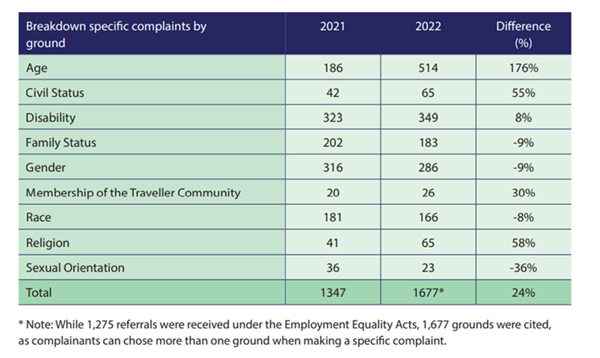In May the Workplace Relations Commission (WRC) published its Annual Report for 2022[1], providing insights into the state of employment claims, highlighting trends, problems, and improvements in the labour market over the past year. With the number of complaints received and adjudication hearings held on the rise, the report acts as a stark reminder of the litany of risks that exist when managing conflicts and disputes in the workplace.
The employment landscape remains challenging for Employers and in the current environment it is essential that pragmatic decisions are being made to limit the risks that may unfold in the future. From a strategic planning perspective there is a necessity for Employers to re-prioritise business objectives in the medium and long term in order to prepare for the future and meet challenges such as retention and talent acquisition head on. The publication of the Workplace Relations Commission 2022 Annual Report comes as a timely reminder of those risks and acts as a cue to ensure Employers are acting in a manner that not only serves the business but also their people.
What we learned from the 2022 Annual WRC Report
Summary of the main key finding are:
- The WRC’s information line dealt with almost 60,000 calls in 2022, an increase from 2019 when pre-pandemic, the WRC dealt with 55,000 calls.
- The WRC website handled over four million page views, a 23% increase on 2021.
- The Inspectorate of the WRC recovered €1.4 million in unpaid wages for employees and carried out 5,820 inspection visits and in the course of these inspection visits over 5,700 specific contraventions of legislation were detected.
- The number of hearings held, and decisions issued by the WRC Adjudication Service each increased by almost 30%.
- The WRC’s Conciliation Service resolved 88% of disputes on which it conciliated.
- There was also a 30% increase in parties willing to engage in mediation.
Adjudication Services
Within the WRC is the Adjudication Service which specifically investigates disputes, grievances, and claims made by individuals and groups under employment, equality, and equal status legislation.
This service reported that during 2022, some 6,263 complaint applications were received which comprised 12,790 individual complaints – an average of two specific (individual) complaints per complaint application. This represented an increase of 4.5% and 6.5% respectively for complaint applications and individual complaints compared with 2021.
Complaints Received
Specific Complaints by Complaint Type
- 3,363 (26%) related to Pay.
- 1,851 (14%) related to Discrimination, Equality & Equal Status.
- 1,518 (12%) related to Unfair Dismissal.
- 1,222 (10%) related to Terms & Conditions of Employment complaints.
Referrals Under the Employment Equality Act, 1998-2015
In particular, there were 1,275 complaints filed under the Employment Equality Act, with 1,677 specific reasons of discrimination cited.
This represents a 37% increase in referrals under the legislation over 2021 (932) when 1,347 specific grounds were specified.
Within the overall referrals, the highest increase was related to Age Discrimination (514) a significant increase of 176% compared to 2021.


Managing an Aging Workforce and Avoiding Age Discrimination
The Irish workforce is getting older and according to the Central Statistics Office, there will be approximately 1.5 million individuals aged 65 and older in Ireland by 2051. With age discrimination claims on the rise, it is essential that Employers are consistent in their application of inclusive practices throughout the employee lifecycle.
Employers should take action to address discrimination in the workplace including not only the implementation of clear policies under Equal Opportunity but also by providing diversity and inclusion training, detailing unconscious bias for better understanding, and ensuring inclusive practices remain to the fore. Employers should also have robust Dignity at Work policies and procedures in place to ensure all concerns of harassment are addressed in an appropriate manner and in order to guide Employees on how to report incidents of discrimination. Where any concerns arise Employers must take swift and appropriate action against those who engage in any discriminatory behaviour.
Discrimination in the workplace is a serious issue that Employers must address. Employers who create an inclusive workplace culture often reap the benefits of increased Employee morale and productivity, leading to a more successful Organisation. Employers who actively work to create a diverse and inclusive workplace will not only benefit their Employees but should also see their Organisations thrive. Staying compliant with legislative requirements is the first step and Employers must ensure adequate protections are in place for Employees through the deployment of appropriate skills in managing complaints and promoting inclusive practices.
If you have any queries about strategic workforce planning to avoid the pitfalls and mitigate the risks of complaints of discrimination, contact the team at Adare Human Resource Management to discuss further.